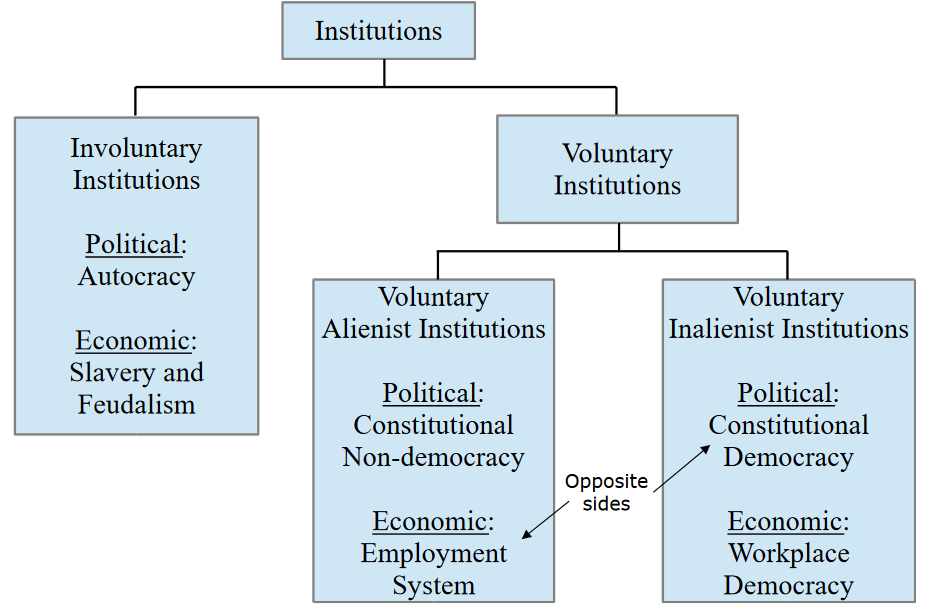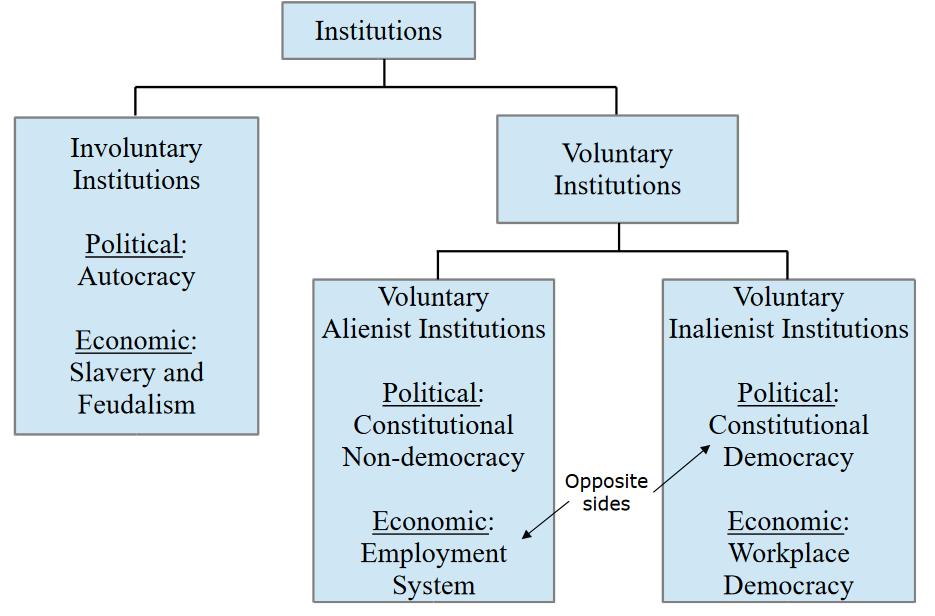I'll write one. The talk argues that employment contract is invalid due to inalienable rights. Inalienable means can't be given up even with consent. Workers' inalienable rights are rooted in their joint de facto responsibility in the firm for using up inputs to produce outputs. By the norm that legal and de facto responsibility should match, workers should get the corresponding legal responsibility, but in employment, workers as employees get 0% while employer gets 100% of results of production
jlou
You called centrists framing the debate about capitalism as one of consent vs. coercion a strawman then accepted the framing. Democratic theory requires consent. It just also requires consent to delegate ruling out consent to alienate management/governenance rights justified by inalienable rights.
Stable employee-owned firms:
https://www.nceo.org/articles/employee-ownership-100
A country that lets people sell voting rights wouldn't be democratic for long. Does democracy not work? Is it undesirable?
David Ellerman's modernization of the classical laborists' argument against capitalism is significantly more powerful than modern Marxism.
Marx's claim that private property is the root of capitalist appropriation has been disproven in modern theories of capitalism's property rights structure. Private property plays a role in giving bargain power to get favorable terms, but the ultimate legal basis of capitalist appropriation is the employer-employee contract
Postcapitalist systems can use market prices and, in principle, be Pareto optimal on non-institutionally described states of affair
Not a strawman. There are tons of examples of framing the capitalism issue in terms of consent vs coercion. Nozick talks about capitalist acts between consenting adults etc.
Many worker coops and majority employee-owned ESOPs exist today. It works.
Democratic theory argues that contracts based on consent to alienate are inherently invalid. Since the employment system is on the "wrong" side, the original theory invalidating these contracts is ignored and forgotten
Alienist vs inalienist refers to whether voting/control rights are transferable (alienable).
Better to say institutions based on consent to alienate vs delegate
Voting rights' transferability with alienist systems implies inequality, but the core point is consent to alienate vs. delegate.
The employment contract is inherently an alienation contract. The workers give up and transfer the management rights to the employer and the employer manages in their own name
Alienist refers to alienation of rights.
Alienist = completely give up and transfer control rights with the recipient ruling in their own name and not in the name of the people governed
Inalienist = revocable delegation where the people retain control rights with the delegates governing in the name of the people governed
Democratic theory draws a distinction between these 2 types of contracts, and invalidates the former
The diagram should say alienation vs. delegation
Private property rests on the principle of people getting the fruits of their labor. In other words, private property appropriation has a labor-basis that capitalism denies. Capitalism violates the very principle behind private property by giving workers 0% joint claim on the positive and negative fruits of their labor
"Property is theft!" -- Proudhon
The employment contract is what really enables capitalist appropriation.
I agree with your critique of capitalist liberal democracy
Because most liberals don't consistently apply their own principles. A principle that liberals are inconsistent with is the juridical principle of imputation, the norm of legal and de facto responsibility matching. They ignore this norm's routine violation in the capitalist firm. Here, despite the workers joint de facto responsibility for production, the employer is solely legally responsible for 100% of the positive and negative results of production while workers as employees get 0%



The root of the loss of community that everyone feels is capitalism's total emphasis on institutional logics of exit that make everything extremely transactional while completely ignoring the dual institutional logic of commitment, cooperation and voice. Community emphasizes the latter. We need communities based around shared property, mutual aid and collective action. Incidentally, having such communities could help solve some public goods problems in a non-state manner and be more egalitarian